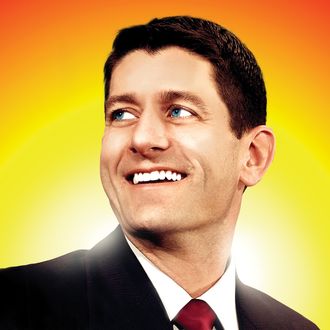
I was prepared (and — warning! — remain prepared) to field all manner of debate over my story about Paul Ryan. The one thing I did not anticipate having to defend is the proposition that it is, in fact, a critical story. Yet Karoli, at Crook & Liars, has a fascinating post which is premised on the belief that I have written a fawning puff piece. It’s not even the sort of ideological criticism one might expect from the left — i.e., “Chait criticizes Ryan as merely a slippery pol who wants to hurt the poor rather than the murderous cog in the corporate-military complex he truly is.” She actually thinks the piece is a straight-up attempt to boost Paul Ryan.
What makes Karoli’s piece so compelling is that it is oddly … convincing. To be sure, pretty much the entire world has interpreted my story as a piece of criticism of Ryan. And yet, applying a few different assumptions, added to a certain obtuse reading style, you can just as easily read my piece the other way. She begins by describing me as a “Villager,” the lefty blog terms for elite centrist Washington reporters and pundits. From there, she interprets my descriptions of Ryan’s power within the Republican Party and ability to mislead people about his beliefs as praise:
Thank you, Jonathan Chait, for this awesome NYMag article telling us how to count the ways Paul Ryan is the Great American Hero. What would I have ever done without being enlightened in such an obsequious way, beginning with the title: The Legendary Paul Ryan? …
The deification process begins. It begins because Villagers don’t have a detailed understanding of the topics they report on, and it continues because people like Jon Chait paint Paul Ryan in rosy shades like a Thomas Kinkade scene with bluebirds and daisies alongside the river, with Ryan standing in light emanating from God himself, anointing him as the Chosen One.
The other source of Karoli’s misunderstanding is that she reads side comments, that I intended to be arch-commentary, in the opposite of its intended spirit. Indeed, if you tried to program a computer to analyze magazine articles, and the program was incapable of understanding language in anything but its most literal sense, you would get precisely the misunderstanding that Karoli exhibits. So, for instance, when I noted the constant habit of reporters assuming that Ryan shies away from political ambition and noted how odd it is that he has advanced so rapidly despite his apparent lack of ambition, Karoli takes this as me maddeningly endorsing the assumption that Ryan lacks ambition. (“Of course he’s not ambitious. Jon Chait has told you so.”)
Likewise, my closing anecdote described a news story depicting Ryan as a bold, reform-minded budget-hawk, and it set up a stunt where the reporter opened to a random page in the budget and asked Ryan to explain. The page happened to open to a program where President Obama eliminated a notorious form of corporate welfare that Ryan had fought to preserve. I described this as unlucky for Ryan. Karoli pounces:
Oh noes, really? How unlucky for Paul Ryan, that a reporter would illuminate his hypocrisy and possibly evenreport on it!
Right — that, uh, wasn’t the point I was actually trying to make.






























